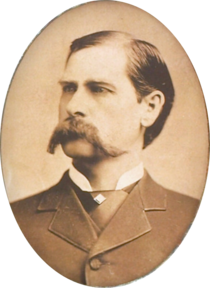 The other night at dinner with my family, an interesting topic found its way into our conversation. My father, sister, and I, having all recently watched a documentary about Wyatt Earp, were each astonished to think of Earp living until 1929. Earp, the "star" of the OK Corral--he lived in Los Angeles, loved the movies, and wanted William S. Hart to play himself. He was a 20th-century man! My sister remarked that she never thinks about prominent historical figures of the 19th century living into the 20th. There is some sort of firm divide, a border that comes along with the death of Queen Victoria in 1901, that separates people of the 19th century from those of us who lived during the 20th century.
The other night at dinner with my family, an interesting topic found its way into our conversation. My father, sister, and I, having all recently watched a documentary about Wyatt Earp, were each astonished to think of Earp living until 1929. Earp, the "star" of the OK Corral--he lived in Los Angeles, loved the movies, and wanted William S. Hart to play himself. He was a 20th-century man! My sister remarked that she never thinks about prominent historical figures of the 19th century living into the 20th. There is some sort of firm divide, a border that comes along with the death of Queen Victoria in 1901, that separates people of the 19th century from those of us who lived during the 20th century.I have to admit that I feel that dividing line as well between 1901 and 1902, between the centuries as marked off by the great Victoria. What strikes me more, however, is my own connection with the 19th century. That connection goes like this:
- My grandmother, Fern Susan Gumz Stratton, was born in 1909;
- She was alive when some of the great historical figures of the 19th century were also alive;
- I grew up close to my grandmother; ergo
- I am connected to the 19th century.
All right, I will acknowledge that my thinking is twisty, but I absolutely adore that feeling of being connected to the past. And my own past, since 1961, is not enough (although I am always happy to remember the Christmas that I got my first transistor radio and listened all day to the news coverage of the immenent death of Harry Truman). I want to be connected with a long gone past--and here's how I can be....
In 1910 and 1912, respectively, Florence Nightengale and Clara Barton died. Florence, connected with the Crimean War, and Clara, connected with the Civil War, were both alive when my grandmother was a toddler.
 Harriet Tubman died in 1913--can you imagine? Harriet Tubman, a woman whose story everyone should know! The woman who played an integral role in the Underground Railroad, whose bravery and dedication to her cause are a crucial part of American history--my grandmother was already four years old when Harriet went to her reward.
Harriet Tubman died in 1913--can you imagine? Harriet Tubman, a woman whose story everyone should know! The woman who played an integral role in the Underground Railroad, whose bravery and dedication to her cause are a crucial part of American history--my grandmother was already four years old when Harriet went to her reward.In 1927, my grandmother was 18 years old--and Lizzie Bordon died. While my grandmother never took an axe and gave her father 40 whacks, the fact that Lizzie Bordon lived so far into the 20th century creeps me out, and may have bothered my grandmother as well.
But what really anchors me to the 19th century happened in 1938. On the 75th anniversary of the Battle of Gettysburg, a reunion was held. Twenty-five veterans of that great battle were in attendance, as well as over 1,800 other veterans of the Civil War. Yes, while my grandmother was a new bride, men who had fought in the Civil War were gathering together to remember what must have been the most important time in their lives.
Whether by visiting historic sites, studying history at school, reading history for the sheer pleasure of it, or tracing my own family and the families of friends, I love exploring the ways in which we are all connected with the past. I'm practically a 19th-century woman!


No comments:
Post a Comment